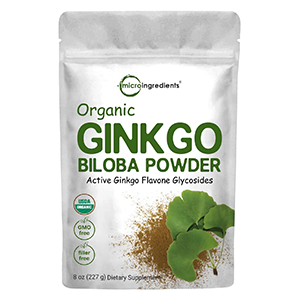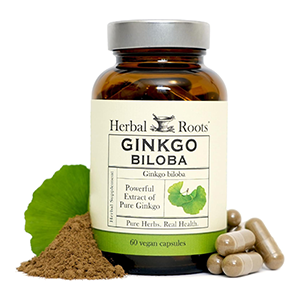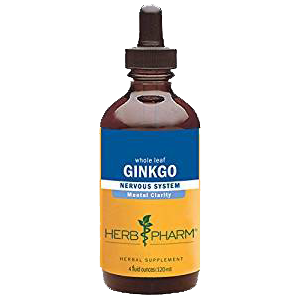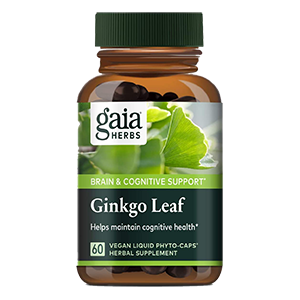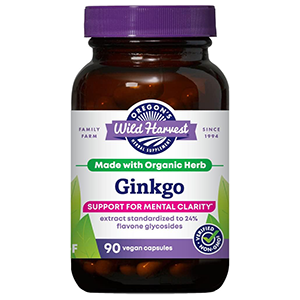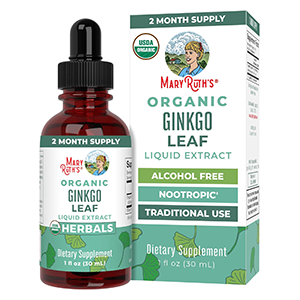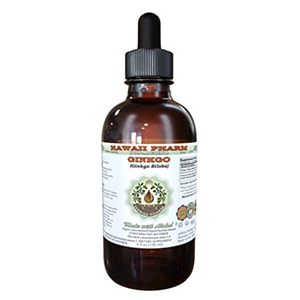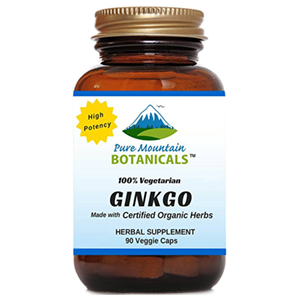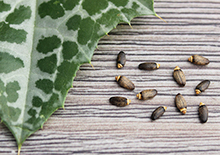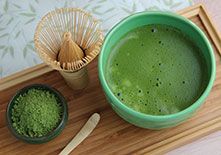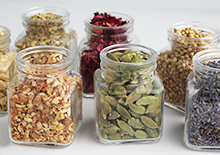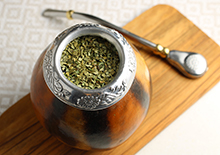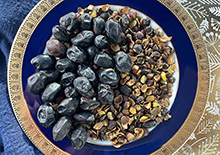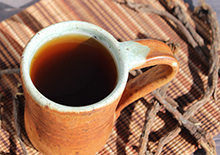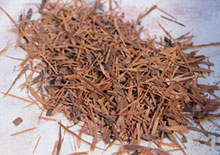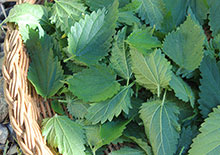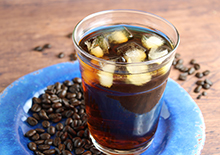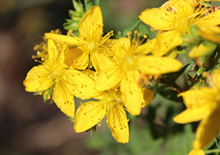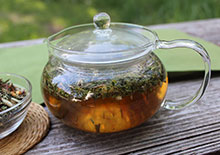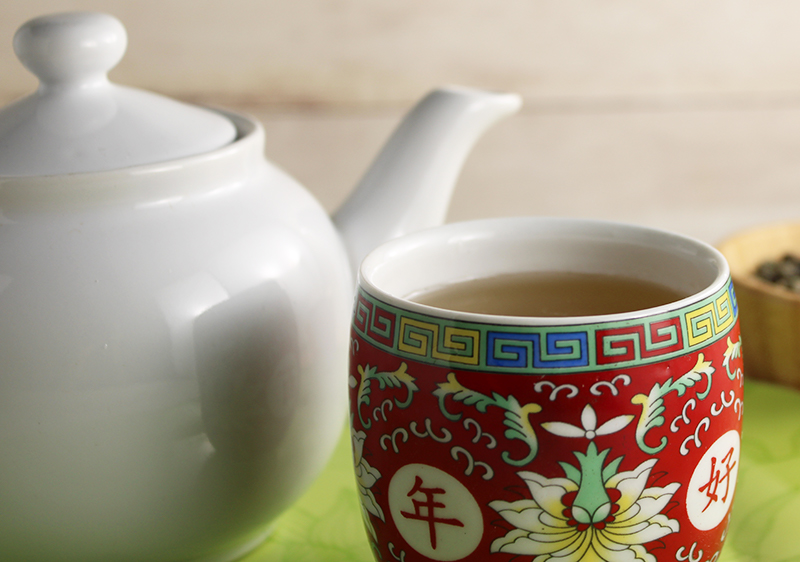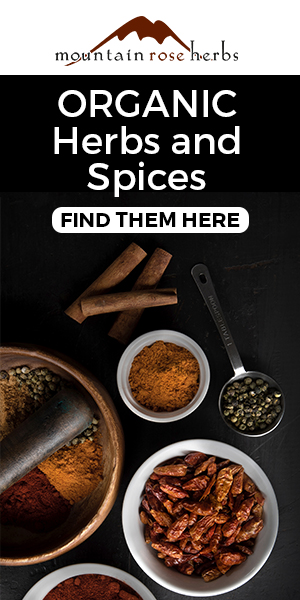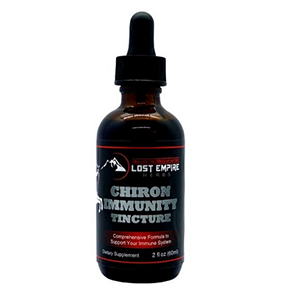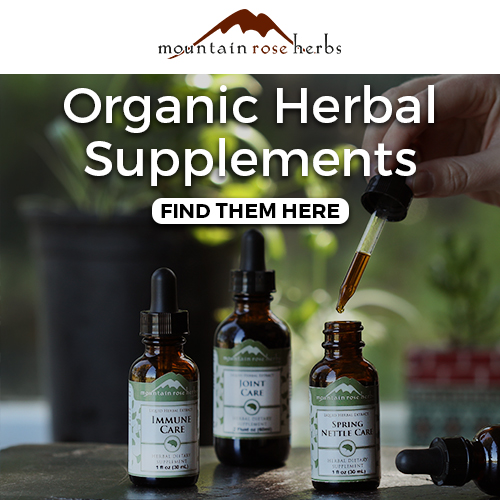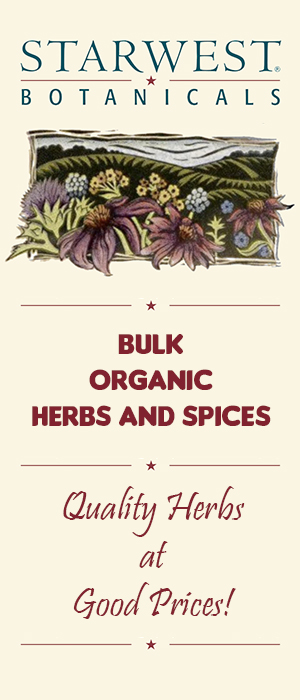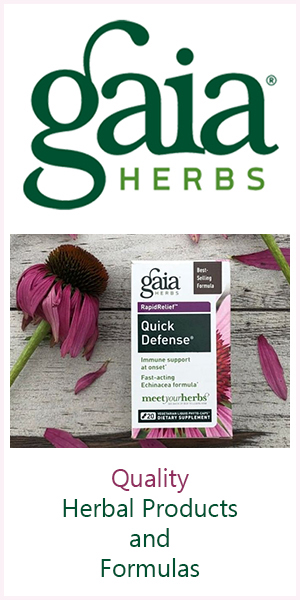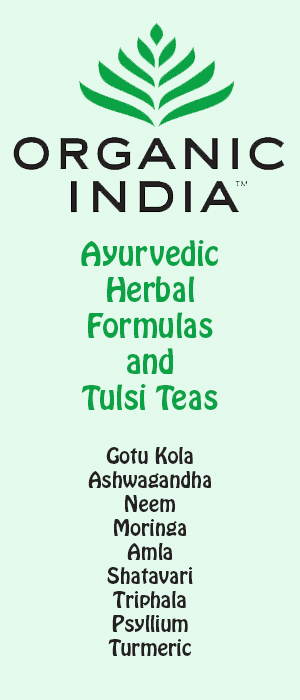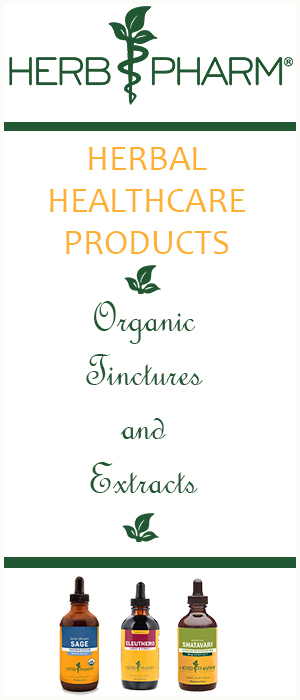- Home
- List of Herbs
- Ginkgo Biloba Benefits
Ginkgo Biloba Benefits, Circulatory Stimulant and Brain Tonic
Intro | What is Ginkgo Biloba? | Purchasing High Quality | What is EGb761? | Potential Toxic Effects | Health Benefits | Harvesting Ginkgo Leaves | Types | How to Use | Precautions | Shop
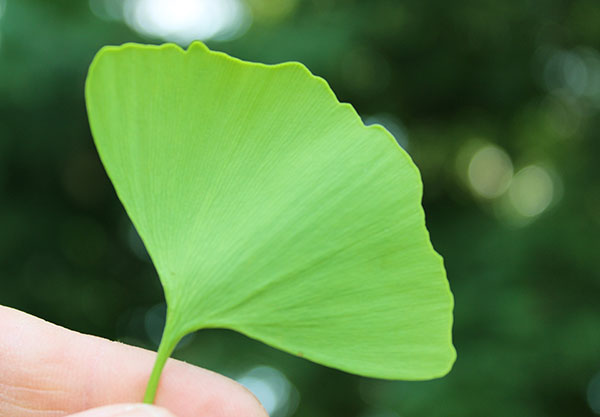
Ginkgo biloba benefits have been studied extensively in the past several decades as one of the top super herbs for improving cognitive functions, especially in those with aged-related neurodegenerative diseases.
Referred to as yín xìng in Chinese medicine, the leaves of the ginkgo tree have long been used by herbalists for their effects as a brain tonic helpful for improving memory and the ability to concentrate. As a blood vessel dilator, it works directly with the circulatory system to increase oxygen supply to the brain and is additionally supportive to the heart and lung meridian systems.
Table of Contents
Intro | What is Ginkgo Biloba? | Purchasing High Quality | What is EGb761? | Potential Toxic Effects | Health Benefits | Harvesting Ginkgo Leaves | Types | How to Use | Precautions | Shop
Chemical analysis reveals a number of active constituents specific to the ginkgo tree species such as the terpenes, ginkgolides and bilobalides, as well as other potent antioxidants including flavonoid glycosides, myricetin and quercetin. (Source)
As a gentle herbal stimulant with a highly protective influence on the central nervous system, it has been shown to guard against oxidation and prevent damage to nerve cells. Also considered a natural anti-depressant, it can help to uplift one's mood, alleviate anxiety and tends to encourage a general sense of well-being. Ginkgo has furthermore proven helpful for a variety of cerebrovascular related conditions, like strokes and neurological disorders. (*)
Health professionals in both Asian and European countries have been using and prescribing Ginkgo biloba extracts, like EGb761, for many decades for elderly adult patients. It has most significantly been used and researched for its therapeutic effects on those with dementia and Alzheimer's. Extracts have been shown to influence an increase in cerebral blood flow, enhance memory, improve mental capacities and have been identified effective for those with these degenerative conditions. (*)
The concentrated medicinal components are exclusively found in the rounded lobed leaves of the ginkgo tree and like the "doctrine of signatures", also signifies the shape of the human brain. Although ginkgo teas are slightly beneficial, for increased effectiveness the leaves must be tinctured or processed as an extract to activate and condense the principle ingredients.
What is Ginkgo Biloba?
Ginkgo biloba comes from an ancient tree species and one of the oldest identifiable plant families on earth with leaves found fossilized in prehistoric rock dating back to the Permian period over 250 million years ago. The trees are known to have once widely inhabited much of the earth's surface but shrank during the ice age to a small population confined to regions of Southern China. The popular cultivated variety we know today is believed to have been preserved by Buddhist monks who regarded it as a sacred tree species.
The trees are extremely resistant to environmental toxins and climatic weather conditions, surviving the ice age as well as the atom bomb in some areas of Hiroshima. They are also long-lived trees with evidence of some planted ginkgo's at temple sites in China reported to be close to 1,500 years old.
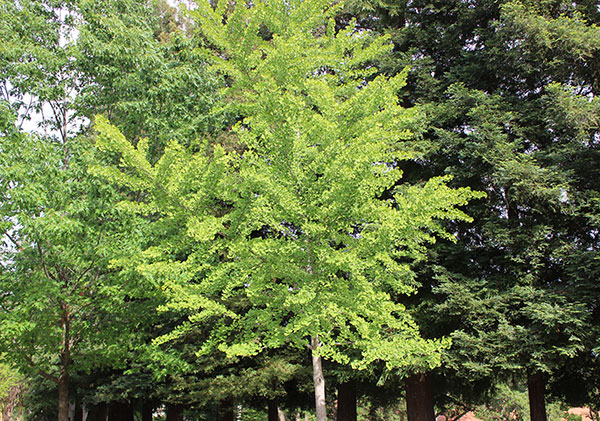
A widely cultivated species, the trees now grow all over the world with some naturalization and seedlings spreading into wild habitats.
Modern day ginkgo is one of the world's most top planted "street trees" for its ornamental look and its ability to tolerate urban environments, absorb pollutants and increase air quality. In China, Korea and Japan the ginkgo is a revered tree species and is the capital symbol of Tokyo, Japan as well as the national tree of China.
Visit our other pages on the Secret Uses of Ginkgo for Aging Adults.
Ginkgo biloba, also called maidenhair tree, is from the plant family Ginkgoaceae and is a large growing tree reaching heights of 66–115 feet (20–35 m) or much larger. Ginkgo trees are most popular in the fall season for their brilliant golden colored leaves, usually about 6 in (15 cm) wide and 3 in (8 cm) long, and can remain on the tree for up to 2 weeks after turning color. Like all dioecious trees, some ginkgo's are male and some are female.
Most ornamental species, like the "Autumn Gold"
variety, are male because they don't produce seeds which are known to
have a strong malodorous odor.
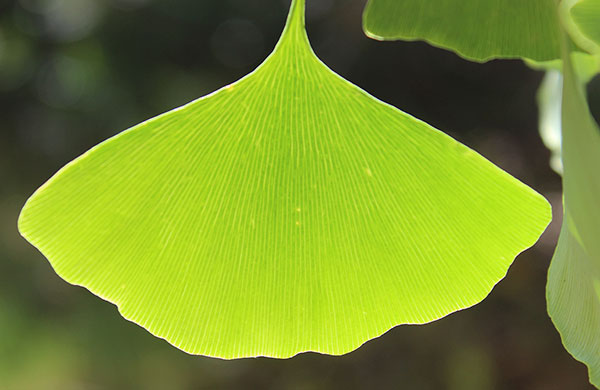
Purchasing High Quality Ginkgo
Ginkgo is one of the most highly commercialized and marketed herbal supplements in the health industry. It is found as an antioxidant additive in many extremely caffeinated energy drinks and literally hundreds of products, pills, soft drinks and energy bars advertised as a quick way to enhance cognitive performance and improve one's memory skills.
Although these claims may be true for some quality ginkgo extracts, there is also a large degree of manipulation on the part of huge mega-corporations looking to take advantage of the situation for capital gain. Unfortunately, this has created, in our opinion, an influx of low quality ginkgo products not really beneficial to human health.
When it comes to purchasing your ginkgo tinctures or extracts, it is therefore considerably important to use reputable brands that offer high concentrates of pure undiluted ginkgo for highest health benefits.
Our Top Favorite Brands
- Mountain Rose Herbs, tinctured extract, capsules and bulk leaf
- Gaia Herbs, Ginkgo, standardized extract
- Herb Pharm, tinctured extract
- Dragon Herbs, Diamond Mind Formula
- Nutrigold, Ginkgo biloba, standardized extract
- Healthforce Superfoods, CircuForce Brain Power
- Oregon's Wild Harvest, organic ginkgo capsules
- Hawaii Pharm, organic ginkgo liquid extract, alcohol-free
- Pure Mountain Botanicals, organic capsules
- Micro Ingredients, organic ginkgo powder
- Buddha Teas, organic pre-packaged tea bags
What is EGb761?
The original studies on ginkgo were conducted using G. biloba extract EGb761, a standardized extract developed by Schwabe Pharmaceuticals, a Germany-based company, in 1975 concentrating the active compounds from the ginkgo leaves.
Today there are many standardized formulas, which by definition are created to contain a specific ratio of 24% ginkgo flavonoid glycosides and 6% terpene lactones. The flavonoid glycosides are primarily quercetin, myricetin, kaempferol and isorhamnetin, while the terpene lactones consist of ginkgolides A, B and C, and bilobalide. Other constituents also include proanthocyanadins, rhamnose, D-glucaric, ginkgolic acids and glucose. (Source)
Potential Toxic Effects of Ginkgo Biloba
Recently, in 2013, there was a study conducted analyzing the carcinogenic potential of ginkgo extracts on laboratory mice and rats given very high doses. The results indicated "carcinogenic potential" in the thyroid gland and nose with malignancy and "incidence of hepatoblastomas" in the liver organ. In this study, however, they were not using the type of ginkgo, EGb761, used in previous and present-day studies, but a Chinese pharmaceutical-derived variety.
So, the question is, can extremely high doses of ginkgo taken on a regular basis cause liver cancer? Again, not all ginkgo extracts and supplements are created equal. We believe that quality is key when it comes to ginkgo leaf products.
A very significant point to make about ginkgo leaves is that they are great pollution absorbers and in fact many ginkgo extracts and herbs have shown to be contaminated with high lead levels as well as other heavy metals. The leaves grown in urban areas can potentially concentrate a number of pollutants and metals, like lead, cadmium, mercury and arsenic. Both cadmium and lead are known liver and kidney carcinogens. Could this be an underlying factor in the one study performed in 2013?
Many ginkgo leaves harvested in China are heavily contaminated, either from the soil, water or from industrial fallout. Statistically, U.S. grown ginkgo seems to have almost zero lead content, other toxins or metallic substances. According to the Merck Manual, concentrations of lead in the blood at 0.35 ppm, liver at 10 ppm, or kidney cortex at 10 ppm are consistent with a diagnosis of lead poisoning in most species.
We feel high quality ginkgo is really the only ginkgo worth consuming. The Natural News Forensic Food Lab gives some reports of ginkgo product testing, some of which are close to 5 ppm in lead content.
It is important for you as the consumer to be aware of this issue so that you can make the most informed decision before making your purchase. This would involve communicating directly with the ginkgo herb or product company, asking them for a full report or Certificate of Analysis (C of A) for heavy metal specifications, which they usually send by email as a PDF document.
All ginkgo products and herbs are tested according to their specific lot number, so results may be different every time with any particular manufacturer.
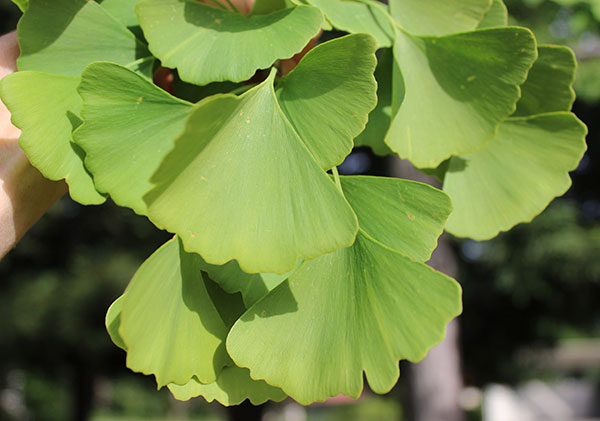
Ginkgo Biloba Benefits
1) Possible Brain Tonic for Cognitive Functions
2) Ginkgo Biloba Benefits for Memory
3) Helpful for the Circulatory System
4) Effective for Alleviating Anxiety and Improving Mood
5) Ginkgo Biloba Benefits for the Eyesight
Possible Brain Tonic for Cognitive Functions
Because of ginkgo's proven ability to slow down mental decline in elderly adults, it is one of the most commonly used herbal supplements around the world for its potential effects at enhancing cognitive functions.
The medical benefits of Ginkgo biloba extract are primarily attributed to two groups of bioactive compounds, the flavonoid glycosides and the terpene lactones, two components that work together to provide blood flow to the brain as well as protect and stimulate neurons. As we mentioned, standardized ginkgo extracts are composed of 24% flavonoid glycosides, like myricetin and quercetin, and 6% terpene lactones, like ginkgolides and bilobalides.
Ginkgo biloba extracts are scientifically shown in lab animal studies to work specifically in the hippocampus, the brain's memory center, promoting new nerve cell formation as well as the nerve cell connections (or synapses) between them, important for short and long-term memory and information processing.
In one study it was shown to have potential effectiveness against the toxicity induced by beta amyloid peptides on hippocampal cells and was demonstrated to "support the therapeutic usefulness in treating aged-related central nervous system disorders."
Ginkgo is commonly known to act as a brain tonic because it improves cerebral blood circulation. The terpenoid constituents, such as ginkgolide B, found in ginkgo bilioba benefits the cerebrovascular system by improving blood flow, decreases platelet stickiness, acts as a blood vessel dilator and increases the transport of oxygen and glucose to the brain.
Ginkgo Biloba Benefits for Memory
One particular study given the most attention regarding its effect on memory recall is referred to as the GEM studies (Ginkgo Evaluation of Memory), an 8 year study conducted in a number of U.S. medical centers on participants age 75 and over with cognitive impairment.
G. biloba at 120 mg twice daily proved ineffective for reducing general occurrence of dementia or Alzheimer's. Some further investigation in 2010 offered alternative interpretations of these results suggesting that the follow-up period was too short as pre-dementia is known to progress over decades and not be as effective when these diseases are too advanced.
For more detailed analysis see the follow-up study: "Ginkgo Biloba Extract and Long-Term Cognitive Decline: A 20-Year Follow-Up Population-Based Study."
2014 Research on Ginkgo and Neurodegenerative Disease
Current 2014 research
indicates Ginkgo biloba benefits are indeed health enhancing
for those
with age-related cognitive decline, especially in regards to slowing the
deterioration of mental capacities rather than preventing
"neurodegenerative
progression of the disease."
Likewise, in other 2014 research studying the effects of EGb761, the extract was proven to help "stabilize or slow decline in cognition, function, behavior, and global change at 22-26 weeks in cognitive impairment and dementia, especially for patients with neuropsychiatric symptoms."
In a study published in the Clinical Interventions in Aging it was stated that, "meta-analyses confirmed the efficacy and good tolerability of Ginkgo biloba extract EGb761 in patients with dementia."
Alzheimer's disease, being one of the most common forms of senile dementia, is characterized by abnormal amyloid beta (Aß) accumulation in the brain parenchyma and cerebral capillaries, causing blood-brain barrier disruption. In other current research, Ginkgo biloba benefits were shown to decrease the factors involved in amyloid beta plaque cytotoxicity, helpful for slowing the progression of Alzheimer's and was acknowledged to "provide a rational basis for the therapeutic application of EGb761 in the treatment of AD."(*)
Ginkgo extracts and herbal tinctures, while they may be effective for conditions like Alzheimer's, do not address the potential underlying cause of the mental deterioration. Other lifestyle changes might also be appropriate to help boost brain health over the course of one's life span. This may include physical and mental exercise, heavy metal detoxification, uptake of omega-3 fatty acids, adequate nutritional vitamin/mineral intake as well as the consumption of antioxidant-rich foods.
Ginkgo Biloba Benefits Controversy
While there is much proven research on the health enhancing effects of ginkgo on elderly adults with neurodegenerative conditions, there has been conflicting evidence about Ginkgo biloba's benefits as a brain booster when taken by healthy adults as studies show opposing information. Again, many influences may be involved in these findings, however, we feel supplementation quality is most likely a determining factor required for highest potency and absorption.
The best way to conclude whether Ginkgo biloba benefits might be helpful to any one person, is to take a high quality extract of ginkgo over a period of time and decide for yourself. There are many people, including ourselves, who do experience brain-stimulating effects when drinking the teas, using tinctured extracts or other supplements concentrating the active ingredients.
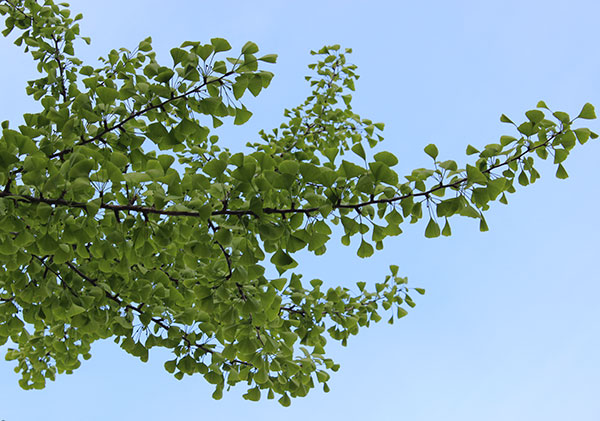
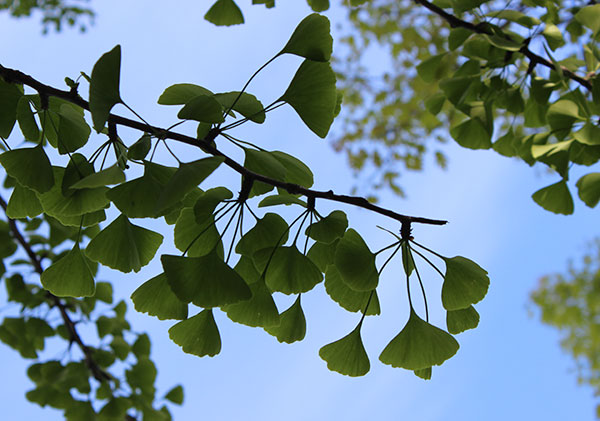
Helpful for the Circulatory System
Ginkgo biloba's effects at increasing blood flow help to promote good blood circulation to both the cerebral and cardiovascular systems.
The medical definition of cerebral circulation is "the movement of blood through the network of blood vessels supplying the brain. The arteries deliver oxygenated blood, glucose and other nutrients to the brain and the veins carry deoxygenated blood back to the heart, removing carbon dioxide, lactic acid and other metabolic products." (Source) Cerebral circulation and regulated blood supply to the brain is very important for preventing cerebrovascular conditions such as strokes.
Studies demonstrate ginkgo's effectiveness as a vasodilator particularly for improving "endothelium-dependent vasodilatory capacity." The endothelium is the thin single layer of flat cells that lines the interior surface of blood vessels. (*)
Ginkgo biloba benefits help to open, widen and relax the blood vessels, maintaining the blood supply to very tiny vessels and capillaries. These actions are very nourishing for the brain, but also the eyes, ears, skin, lungs and heart as well as other vital organs and systems connected to the circulatory or cardiovascular system.
Some of the ginkgolide compounds have shown to inhibit platelet aggregation or stickiness which is beneficial for preventing atherosclerosis or coronary heart disease.
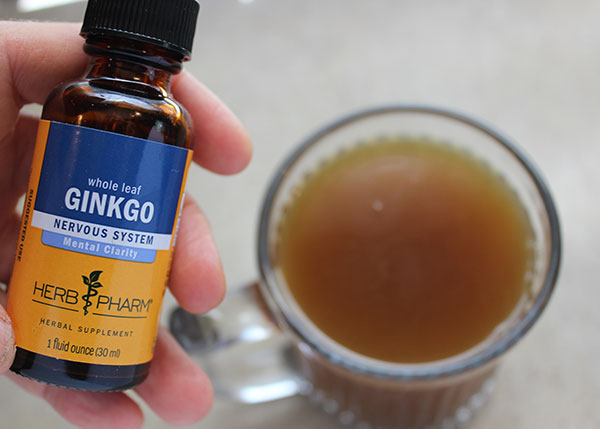
Effective for Alleviating Anxiety and Improving Mood
Ginkgo biloba leaves and extracts, containing bilobalide terpenes, have strong antioxidant properties that are protective to the entire central nervous system. Many herbalists consider ginkgo to be an adaptogen because it helps the body appropriately respond to stress, acting as a natural nerve tonic with effectiveness against treating general anxiety disorder and improving one's mood.
Ginkgo is one of those herbs that works really well when used with Panax ginseng for increasing adaptogenic properties that help to relieve stress-related tension.
In a study published in the Journal of Psychiatric Research conducted on young and elderly adults, evidence confirmed enhanced cognitive function, stabilized mood and alleviated anxiety-related symptoms. In another study the "anti-stress" effects of standardized ginkgo extracts were shown to be a result of its ginkgolide compounds and their ability to decrease the expression of the peripheral benzodiazepine receptor of the adrenal cortex.
Ginkgo Biloba Benefits for the Eyesight
Antioxidants in the leaves not only extend to the brain, but also the retina of the eye, with many studies suggesting that Ginkgo biloba benefits people with macular degeneration and diabetic retinopathy.
In one 2015 study conducted on patients with glaucoma and age-related macular degeneration using a ginkgo based supplement, results reported "Subjective improvement, reduction of visual and mental fatigue, increase of light sensitivity, as well as statistically significant improvement in visual functions (at both computer perimetry and electrophysiological studies) were achieved."
Harvesting Ginkgo Leaves
There is nothing like harvesting your own fresh leaves from the Ginkgo biloba tree. If you have never seen a ginkgo tree, they are quite distinct
compared to other trees with a magical quality that shimmers in the wind, much like birch or
aspen.
The leaves can be harvested in the summer months when they are green but are most medicinally potent in the fall season, just after they start to turn a yellow-gold color. According to Christopher Hobbs, in his book, "Ginkgo, Elixir of Youth", the best time to pick the leaves for highest concentration of flavonoid content is after the leaves turn yellow. The best time for highest ginkgolides and bilobalide content is in late summer just before the leaves begin to turn color.
We recommend making alcohol tinctures of the leaves using them in both of these stages. It is considerably important that your ginkgo tree source is not located in an urban or industrially polluted environment for the reasons previously mentioned.
Many ginkgo manufacturers typically view yellow leaves to be more medicinally potent. Some herbal company's, like Mountain Rose Herbs, sell both dried semi-green and gold varieties, which you can use to make your own extracts.
Ginkgo Leaf Identification and Harvesting
The green to yellow leaf of the ginkgo is slightly circular at one end with irregular edging and is sometimes divided into two lobes or segments. The fan-shaped leaves are quite easy to recognize, with lines moving in a vertical direction. It is always important, of course, to positively identify any herb or wild green before consuming it as a food or plant extract.
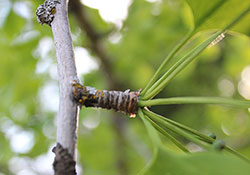
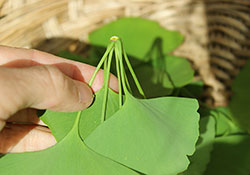
The stems of the ginkgo leaf grow right off a branch node and are easy to harvest by pulling down the flexible branches and snapping them off with a backward hand movement.
It is vital, when harvesting wild plants,
that you do so in a respectful manner, leaving no damage to the plant or tree that hinders it's continued growth and life cycle.
Types of Ginkgo
- Fresh Ginkgo Leaves - the freshly harvested leaves can be used in tea infusions, dried or tinctured in alcohol.
- Dried Ginkgo Leaf or Powder - good for making teas and tinctures.
- Standardized Extracts - specific formulations of 24% ginkgo flavonoid glycosides and 6% terpene lactones.
- Ginkgo Tinctured Extracts - ginkgo leaves tinctured in an alcohol or glycerin-based menstruum.
- Herbal Formulations - hot water extracts of ginkgo blended with other herbs like gotu kola and ginseng.
- Capsules or Tablets - created using either powdered extract or straight leaf powder.
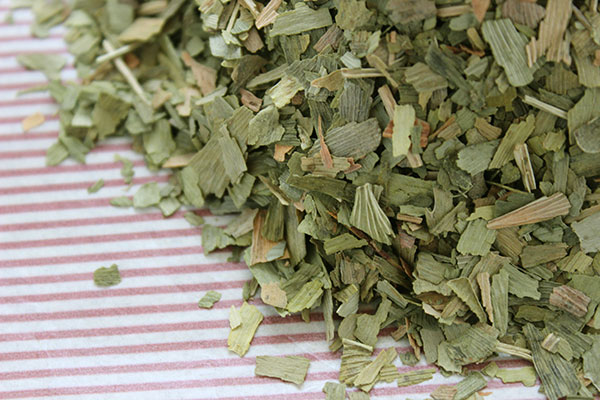
How to Use
Depending on your current health issues standardized extracts may be appropriate as they are higher in active compounds. As a mild daily brain boosting supplement, liquid tinctures might otherwise be a more suitable option.
We are personally not big fans of standardized extracts, although they have been proven effective in many regards. We feel it is best to take herbs in their complete form which includes both active as well as the "inactive" compounds.
In our opinion, this helps to provide greater
bioavailability and uptake of the primary ingredients, delivered closer
to the way nature intended with less potential side-effects. If you do
decide to take EGb761 or others, we would also advise taking the whole
liquid tinctured extract along with the standardized formula.
Like other herbs, ginkgo leaves are best if heated or prepared in alcohol to help release their beneficial components. Fresh or dried leaves can be used to make teas and are good to use as a natural, energizing, non-caffeinated herbal stimulant.
Dosage Recommendations
We advise following the recommended daily amounts specific to each ginkgo supplement as they all vary in potency. Generally standardized dosages are between 40-240 mg taken twice or three times daily.
Using Ginkgo with Other Herbs
Adding ginkgo to herbal teas helps to increase the effects of other tonic adaptogens or medicinals. For this reason, Ginkgo biloba is often used with other herbs in herbal tea recipes particularly, gotu kola, brahmi (bacopa), rhodiola, tulsi as well as ginseng. Because of ginkgo's ability to increase the rate of blood flow, not only to the brain, but to the entire circulatory system it is often used with gotu kola, another vascular dilator also beneficial for varicose veins.
When used with ginseng, tulsi or rhodiola it works synergistically to help increase energy and improve one's ability to concentrate or focus. Other current findings suggest that Ginkgo biloba benefits dementia when used with coriolus mushroom and its health enhancing polysaccharides. (Source)
Precautions:
Consult your physician if you are on antidepressants, prescribed medications, especially blood thinners, or are pregnant, breastfeeding or have serious health conditions. High doses on an empty stomach occasionally cause nausea, dizziness and skin eruptions. In rare cases some individuals have allergic reactions to the long-chain alkylphenols found in the leaves.
Shop Related Products (About Affiliates & Amazon Associate Paid Links)
Affiliate Disclaimer: This section contains affiliate product links. If you make a purchase through our recommended links, we receive a small commission at no additional cost to you. Thanks for the support.
